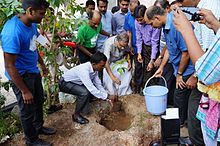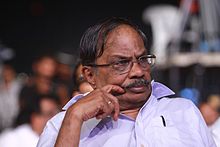
Sankarankutty Kunjiraman Pottekkatt was an Indian writer of Malayalam literature, traveller, and politician from Kerala. Best known for his travelogues, he has authored nearly 60 books, which include 10 novels, 24 collections of short stories, three anthologies of poems, 18 travelogues, four plays, a collection of essays and a couple of books based on personal reminiscences.

Thakazhi Sivasankara Pillai, popularly known as Thakazhi after his place of birth, was an Indian novelist and short story writer of Malayalam literature. He wrote over 30 novels and novellas and over 600 short stories focusing on the lives of the oppressed classes. Known for his works such as Kayar and Chemmeen, Pillai was a recipient of the Padma Bhushan, the third highest Indian civilian award. He was also a recipient of the Jnanpith, India's highest literary award, awarded in 1984 for the novel Kayar.

Parutholli Chalappurathu Kuttikrishnan, popularly known by his pen name Uroob was an Indian writer of Malayalam literature. Along with Basheer, Thakazhi, Kesavadev, and Pottekkatt, Uroob was counted among the progressive writers in Malayalam during the twentieth century. He was known for his novels such as Sundarikalum Sundaranmarum and Ummachu, short stories like Rachiyamma and the screenplays of a number of Malayalam films including Neelakuyil, the first Malayalam feature film to receive the National Film Award. He was a recipient of several honours including Kendra Sahithya Academy Award and the inaugural Kerala Sahitya Akademi Award for Novel.

Attoor Ravi Varma was an Indian poet and translator of Malayalam literature. One of the pioneers of modern Malayalam poetry, Ravi Varma is a recipient of Kendra Sahitya Akademi Award, Kerala Sahitya Akademi Award for Poetry and Kerala Sahitya Akademi Award for Translation, besides many other honours. The Government of Kerala honoured him with their highest literary award, the Ezhuthachan Puraskaram, in 2012 and the Kerala Sahitya Akademi inducted him as their distinguished fellow in 2017.

Thinakkal Padmanabhan, popularly known as T. Padmanabhan, is an Indian short story writer of Malayalam literature. He is a recipient of several awards including the Ezhuthachan Puraskaram, the highest literary award of the Government of Kerala. He declined some of the earlier awards he was selected for which include Kerala Sahitya Akademi Award (1973), Odakkuzhal Award (1995) and Sahitya Akademi Award (1996). Mahatma Gandhi University conferred on him the honoris causa degree of the Doctor of Letters in 2018. In 2023, he was honoured with the Kerala Jyothi Award, the highest civilian award given by the Kerala Government.

Thakkathu Amayankottu Rajalakshmi, better identified as Rajalakshmi, was an Indian novelist, short story writer and poet of Malayalam literature. She was the author of three novels, two poetry anthologies and a short story anthologies. Kerala Sahitya Akademi awarded her their annual award for novel in 1960, making her the third recipient of the award. Her novel, Oru Vazhiyum Kure Nizhalukalum, has been adapted into a tele-series as well as into a play by the All India Radio.

Panayanthitta Kunhiraman Nair, also known as Mahakavi P, was an Indian writer of Malayalam literature. He was known for his romantic poems which detailed the natural beauty of his home state of Kerala in South India as well as the realities of his life and times. He received the inaugural Kerala Sahitya Akademi Award for Poetry in 1959. He was also a recipient of the Sahitya Akademi Award.
P. Kunjanandan Nair, better known by his pseudonym, Thikkodiyan, was an Indian playwright, novelist, lyricist and screenwriter of Malayalam. He was known for his contributions to the genre of radio plays and his autobiography, Arangu Kaanatha Nadan, which detailed the socio-cultural development of Malabar in the post-independent period, fetched him a number of awards including the Kendra Sahithya Academy Award, Kerala Sahitya Akademi Award for Biography and Autobiography, Vayalar Award and the Odakkuzhal Award.
N. P. Mohammed, popularly known by his initials N. P., was an Indian novelist, short story writer and screenwriter of Malayalam language. Along with his contemporaries like M. T. Vasudevan Nair, O. V. Vijayan, Kakkanadan, and Madhavikutty, he was known to have been one of the pioneers of modernist movement in Malayalam fiction. He was the president of Kerala Sahitya Akademi and a recipient of several awards including Kendra Sahitya Akademi Award, Kerala Sahitya Akademi Award for Story, Kerala Sahitya Akademi Award for Novel, Lalithambika Antharjanam Award, Padmaprabha Literary Award and the Muttathu Varkey Award.
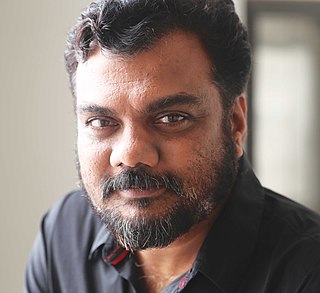
Santhosh Aechikkanam is an Indian writer of Malayalam literature and a screenwriter in Malayalam cinema. He is known for his short stories, which include Komala and Biriyani. He also wrote screenplays for films such as Annayum Rasoolum and Bachelor Party.

Subhash Chandran is a Malayalam novelist, short story writer and journalist from Kerala, India. His work includes the 2010 novel Manushyanu Oru Aamukham and the stories "Vadhakramam", "Sanmargam", "Parudeesa Nashtam" and "Guptham", which have been adapted into films. Chandran is the only writer to receive Kerala Sahitya Akademi Awards for both his debut story collection (2001) and debut novel (2011).
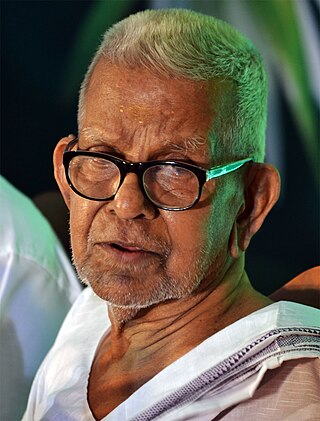
Akkitham Achuthan Namboothiri, popularly known as Akkitham, was an Indian poet and essayist who wrote in Malayalam. He was known for a simple and lucid style of writing, exploring themes of profound love and compassion in his works. Some of his prominent works included Irupatham Noottandinte Ithihasam, Balidarshanam, and Nimisha Kshetram.
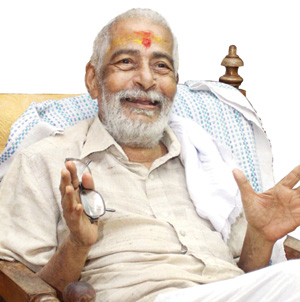
Unnikrishnan Puthur was a Malayalam–language novelist and short story writer. Puthur wrote about 700 short stories and published 29 collections of short stories, 15 novels, a collection of poems and autobiographical writings, among others. He was awarded Kerala Sahitya Akademi Award for the novel Balikkallu in 1968. He received the Odakkuzhal Award in the year 2010 for the book Anubhavangalude Ner Rekhakal.
Chandrika Balan is an Indian writer who has published books in English and Malayalam, under the pen name Chandramathi, ചന്ദ്രമതി in Malayalam. She is a writer of fiction, a translator, and critic in English and Malayalam. Chandramathi has published four books in English and 20 in Malayalam, including 12 collections of short stories, an anthology of medieval Malayalam poetry, two collections of essays, two memoirs, and five books translated from English. The Malayalam film Njandukalude Nattil Oridavela was based on her book.
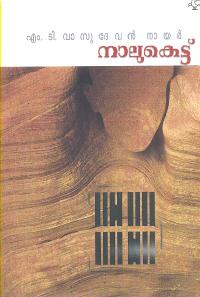
Naalukettu is a Malayalam novel written by M. T. Vasudevan Nair. Published in 1958, it was MT's first major novel. The title attributes to Nālukettu, a traditional ancestral home (Taravad) of a Nair joint family. Like many other novels written by MT, Naalukettu is also set against the backdrop of the crumbling matrilineal order of Kerala in a newly independent India.
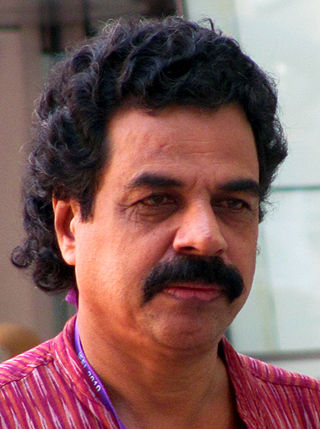
C. V. Balakrishnan is an Indian writer of Malayalam literature. His novels and short stories encompass the emotional issues related to mass culture, sexual politics, fate of the marginalised and institutionalised religions. An author of more than 60 literary works along with a few film scripts and film criticisms, his best known work is the novel Ayussinte Pusthakam. He received the Kerala Sahitya Akademi Award thrice and the Kerala State Film Award for Best Book on Cinema in 2002 for Cinemayude Idangal. In 2014, he won the Padmaprabha Literary Award.

Poovankery Francis Mathews is an Indian author of Malayalam literature and a screenplay writer in Malayalam film and Television industries. A Winner of a National Film Award for Best Screenplay and multiple State television and other literary awards including the Kerala Sahitya Akademi Award for Novel and Kerala Sahitya Akademi Award for Story, he is known for his original style of writing. Literary works such as Muzhakkam, Kadalinte Manam, Adiyalapretham, Iruttil Oru Punyalan, and Chaavunilam and screenplays such as Sararaanthal, Mikhayelinte Santhathikal, Megham, Kutty Srank and Ee.Ma.Yau are his major works.
Chakkalakal Lonappan Jose, is an Indian playwright of Malayalam literature. One of the pioneers of popular Malayalam theatre and a former chairman of the Kerala Sangeetha Nataka Akademi, Jose is the author of 36 plays, 75 one-act plays, one children's play and Ormakalkku Urakkamilla, his autobiography. He is a recipient of the Kerala Sahitya Akademi Award for Drama, Kerala Sahitya Akademi Award for Overall Contributions, Kerala Sahitya Akademi Fellowship, Kerala Sangeetha Nataka Akademi Award, Kerala Sangeetha Nataka Akademi Fellowship and S. L. Puram Sadanandan Puraskaram of the Kerala Sangeetha Nataka Akademi.
T. N. Gopinathan Nair, was an Indian dramatist, novelist, poet, screenwriter and biographer of Malayalam language. One of the prolific among Malayalam playwrights, Nair published 39 plays, besides his four novels, four poetry anthologies and five biographies. He was a member of the council of Kerala Sahitya Akademi and held the char of the Kerala Sangeetha Nataka Akademi. His drama, Pareeksha, received the Vikraman Nair Trophy for the best drama and the Kerala Sahitya Akademi selected his work, Sakshi, for their annual award for drama in 1979.
K. P. Sankaran is a Malayalam–language literary critic from Kerala, India. Born on 15 May 1939 in Painkulam in Trichur district of the erstwhile Kingdom of Cochin, he was a teacher at Changanacherry S.B. College, Trichur Kerala Varma College and Mysore Regional Institute of Education from where he retired in 2001. He resides with his wife Kamala Devi in Kottapparambu near Chelavoor, Calicut since 2019. He has authored around 30 books.


